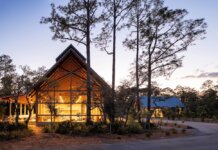
HudsonAlpha Institute for Biotechnology, along with several regional collaborators, has been awarded $1 million from the National Science Foundation’s Regional Innovation Engines program. They are among more than 40 teams to receive one of the first-ever NSF Engines awards.
The HudsonAlpha team’s Greening the Southeast project aims to develop a green circular bioeconomy for building materials and consumer goods in the Southeast that reduces climate change impacts from manufacturing by eliminating industry reliance on petroleum and environmentally costly fibers.
“Our team brings together researchers across plant genomics, crop breeders and experts in biomass processing and biomaterial development to build a pipeline to create products from locally engineered and grown perennial grasses,” said Jeremy Schmutz, HudsonAlpha faculty investigator. “We will use underutilized marginal land, improve atmospheric carbon sequestration, reduce imports and decarbonize industries, all while creating new jobs and training diverse individuals across STEM disciplines.”
Others taking part in the project are Alabama A&M University Winfred Thomas Agriculture Research Station, Auburn University, North Carolina State University, Tennessee State University, Tuskegee University, the University of Georgia, University of Tennessee, Genera, the National Society for Minorities in Agriculture Natural Resources and Related Sciences and other agricultural and workforce development partners.
The NSF Engines Development Awardees have two years to prepare a strong proposal to become a future NSF Engine. Each NSF Engine team has the opportunity to receive up to $160 million.



